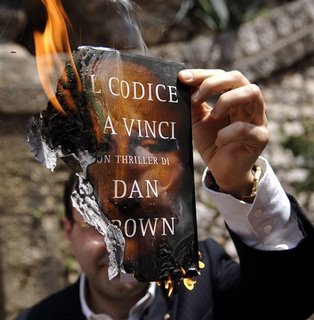Last week I became approximately the 40,000,001st person to purchase and read Dan Brown's thriller The Da Vinci Code. I won't bother giving a synopsis; if you are reading this blog it means you have a computer, are somewhat media savvy and have heard more than you perhaps wanted about Brown's novel. I want to focus on the controversy surrounding the novel and its cinematic counterpart.

The plot of The Da Vinci Code involves a highly erroneous retelling of early Christian history involving a big bad conspiracy. No big deal, after all its only fiction. Except that Brown presents his fabrications as factual history and there are a number of people who truly believe this conspiracy theory. Certain Christian groups have been up in arms about the blasphemy at the heart of The Da Vinci Code. In India, Ron Howard's adaptation was only allowed to play in theaters after additional emphasis was put on the fictitious nature of every element of the film. Catholic film critic Stephen D. Greydanus had the following to say about the movie:
Having read the book, I can't help but see all this reactionary rhetoric as being a bit overblown. In The Da Vinci Code I don't see a threat to the Christian truth, just a page turner that has been very well marketed. As for the conspiracy theory presented as fact, I think Roger Ebert's response is typical of any reasonable audience:In terms of early Christian history, this is not uncomparable to Holocaust denial, to claiming that it was really the Jews who were oppressing the Nazis (or, at least, “we can’t be sure” who was persecuting whom). Yet the meme that “it’s only a movie” or “it’s just fiction” has largely obscured the fact that the conspiracy-theory conceits of The Da Vinci Code are by and large not novelist Dan Brown’s own flights of fancy, but are based on a lunatic-fringe view of history set forth in “non-fiction” books like Holy Blood, Holy Grail and The Templar Revelation.
While these books have about as much credibility as the likes of Did Six Million Really Die? or The Hoax of the Twentieth Century, which is to say zero, many people who would find the raving anti-Semitism of the latter an insuperable obstacle in a thriller seem willing to overlook the raving anti-Catholicism of the former in The Da Vinci Code.
They say The Da Vinci Code has sold more copies than any book since the Bible. Good thing it has a different ending. Dan Brown's novel is utterly preposterous; Ron Howard's movie is preposterously entertaining. Both contain accusations against the Catholic Church and its order of Opus Dei that would be scandalous if anyone of sound mind could possibly entertain them. I know there are people who believe Brown's fantasies about the Holy Grail, the descendants of Jesus, the Knights Templar, Opus Dei and the true story of Mary Magdalene. This has the advantage of distracting them from the theory that the Pentagon was not hit by an airplane.All in all, too much attention is being paid to what is an unremarkable book. Other than its surprise-filled plot, Brown's novel doesn't have much going for it. The characters and dialogue are fairly bland, and he has a bad habit of treating his readers like idiots. If you think too hard, certain plot elements don't make a great deal of sense.
If you're looking for something better than Brown, look no further than to Umberto Eco's Foucault's Pendulum. It has a big conspiracy theory involving some of the same historical groups, but Eco, with his encyclopedic mind and expertise in semiotics (of which Brown's "symbology" is a dumbed down version), is a much better writer than Brown. It's not quite as easy a read, but much more worthwhile.

No comments:
Post a Comment